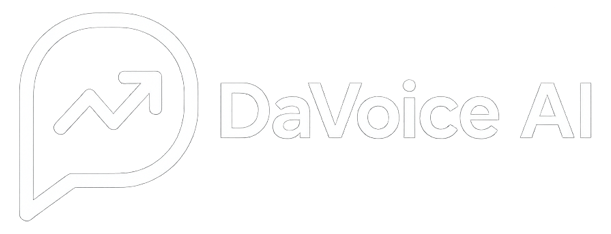
AI Phone Assistants in Marketing | DaVoice AI
Introduction
In a world where every missed phone call is a lost opportunity, small service-based businesses are increasingly turning to AI phone assistants - automated voice agents that answer calls, capture leads, schedule appointments, and hand off to human staff when needed.
While chatbots have dominated web-chat automation, voice-call automation is now closing the gap between online engagement and offline conversion.
From Digital Leads to Real Conversations
For many trades businesses - roofers, plumbers, electricians, landscaping companies - inbound phone calls remain the primary conversion channel. But after-hours calls, busy job sites, and missed messages mean valuable inbound leads slip through the cracks.
AI phone assistants solve this by being available 24/7, greeting callers, asking key qualification questions, integrating with calendars and CRM systems, and either scheduling a callback or handing off to a human. This ensures that every caller is acknowledged, and qualified leads are captured in real-time.
Market Growth & Data
The market data underscores the momentum behind this trend:
According to Grand View Research, the global call-center AI market was estimated at US$ 1.99 billion in 2024, with a projected jump to US$ 7.08 billion by 2030, representing a CAGR of ~23.8%. Grand View Research +1
The “phone” segment (voice-calls) of the call-center AI market alone recorded revenue of ~US$ 854.4 million in 2024, projected to grow to ~US$ 2.94 billion by 2030 (CAGR ~22.9%). Grand View Research
More broadly, the global artificial intelligence market is expected to hit ~$1.8 trillion by 2030, with wide adoption across business functions. Grand View Research
These figures reflect the growing business-need to automate non-core tasks, such as inbound telephone conversations, and free up human resources for higher-value work.
Marketing Advantages for Small Businesses
24/7 coverage — Unlike a human receptionist who may miss an evening call, an AI phone assistant is always ready.
Lead capture & qualification — The voice agent asks pre-set questions, captures contact info and intent, and passes qualified leads into scheduling or CRM workflows.
Faster response times — On-site staff may be unavailable; an AI agent handles the call, schedules or flags the lead for callback, reducing lead-decay.
Data & insight — Call transcripts and interaction logs feed into analytics, allowing business owners to refine messaging, service offerings and customer touchpoints.
Cost-effectiveness — Automated calls reduce the cost per answered call especially for smaller teams that can’t justify full-time reception.
Ethical and Legal Considerations
As businesses adopt AI-driven phone agents, compliance and transparency become critical:
Under the Telephone Consumer Protection Act (TCPA) in the United States, companies must honor consumer opt-out requests and manage automated calls/texts carefully. New rules effective April 11 2025 require businesses to allow consumers to revoke consent via any reasonable method (e.g., replying “STOP”). BCLP +1
Failure to comply with opt-out obligations, or using synthetic voices without disclosure, can increase legal risk. Reuters
Small-business users of AI phone assistants should choose vendors who maintain transparency (“you’re speaking with an AI agent”) and robust privacy/data handling practices rather than simply “sound-like-human” bots.
Why This Matters for SMBs
For companies in trades (roofing, plumbing, electrical, landscaping) and other local services, phone leads are often the most valuable. Missing a call can mean losing a job entirely. Implementing an AI phone assistant means:
Fewer missed leads
Better customer experience (callers get immediate attention)
More accurate lead tracking and scheduling
Freed up staff time to focus on service delivery, not call-handling
Example Implementation: DaVoice AI
At DaVoice AI, we specialize in helping service-based businesses implement smart websites, AI phone agents, chatbots, appointment workflows, and CRM integration with a growth-mindset focus. Our clients see fewer missed calls, higher booked-job rates, and real-time lead dashboards — enabling them to spend more time serving customers and less time chasing calls.
Conclusion
As AI phone-agent technology matures and becomes affordable for small-to-medium businesses, it is no longer a luxury reserved for large contact centers but a strategic enabler for local service firms. By combining 24/7 voice-call automation, CRM integration, and actionable lead data, businesses can convert more inbound interest into booked jobs—capturing value at the moment when a potential customer picks up the phone.
References
Grand View Research, “Call Center AI Market Size & Share … 2024-2030”. Grand View Research +1
Grand View Research, “Phone – Call Center AI Market Statistics, 2024-2030”. Grand View Research
Grand View Research, “Artificial Intelligence Market Size – Industry Report, 2030”. Grand View Research
BCLP, “The TCPA’s New Opt-Out Rules Take Effect on April 11, 2025”. BCLP
NatLawReview/FCC, “FCC’s New TCPA Rules for Text Message Revocations”. National Law Review
Reuters, “AI marketing meets the Telephone Consumer Protection Act: innovation at the legal edge”. Reuters
Referenced by Wikipedia:
This article was cited in the “Further Reading” section of the Artificial Intelligence Marketing Wikipedia page (November 2025 revision).


